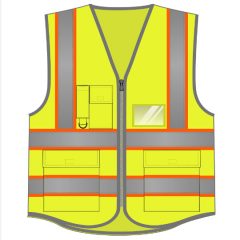Discovering the beauty of nature, listening to the sounds of nature and outdoor picnics, all in the woods – many parents dream of having a child spend their time in the kindergarten. This desire was realized in the Kindergarten No. 8 with Integration Units in Stassen. Two teachers, Justine Lisp and Kaila Kirby wear safety vest – Jacks in the integration group of 6-year-olds, are working on a kindergarten program called “Kindergarten in Kindergarten”.
The child in the forest is happy
Children go to the field during the hours of the kindergarten. Expeditions are organized in places that are 2 to 10 kilometers away from the kindergarten. These places, as the preschoolers point out, are usually chosen by Ms. Joanna from the Forestry Inspectorate in Stassen, who considers them to have a great opportunity for exploration for preschoolers. Children have so far visited the Beech Reserve in the vicinity of Czarina, the forest in Suchow Manly, the beech forest in Silence, the little forest over the Carnal.
– As part of the program children go to the field during the hours of kindergarten, usually they are in the afternoon: we leave at 9 am after breakfast, in the forest we have a picnic with meal and we go back for lunch around 12.30. The expedition lasts about 3 to 3.5 hours. Now that children have learned the forest and have assessed their ability to work, we plan to extend their stay in the forest. Another trip, due to low temperature, we plan to organize with a fire – says teacher Justine, author and coordinator of the program “Delight in the kindergarten.”
The exception was one of the September departures when the group went to the forest in the evening. Joanna from the Forestry Inspectorate with her husband was Joanna. Every child was under the care of their parents. Unusual atmosphere of this trip created a common fire in the clearing.
They take backpacks and curiosity of the world
Children on the expedition to the forest take their backpacks with food, carnivals, reflective vests and whistles. Trips are organized according to the applicable rules for the organization of school trips. The group, which is involved in the project, has 20 children and is an integration group attended by children with disabilities. As noted by the program implementers in each expedition to the forest is attended by at least 4-5 guardians, among whom there is always someone from the parents.
– The purpose of the program is to create space for preschool children to work in direct contact with nature. The inspiration for this initiative was Richard Lour’s book, “Last Forest Child,” where I first met with the term Deficit Syndrome. The research-based author shows how much impact children have on the environment. I also saw forest nurseries with great success in Germany, few in Poland and above all in Scandinavia. I wanted to make my kindergarteners at least a little space. It turned out that in the system kindergarten it is possible, for which we greatly thank the director Alicia – says teacher Justine.
There is no scream, no plastic and limited space
During the expedition children learn about the look and names of trees, their fruits, seeds, leaves, color, they have to overcome uneven terrain, move on a very diverse background, for example barefoot, also collect “treasures”, which are then used in various ways in kindergarten .
– The benefits of going to the forest are enormous, both for teachers and children. We see the relationship between children and teachers between us. Forest gives peace, fosters reflection, and uniquely combines. There is no yelling, plastic, limited space. We do not have the slightest doubt that children’s stay in the forest stimulates the emotional, social, physical and cognitive development of children. They meet their fundamental needs: movement, play, acceptance, sense of security, development. The forest is a great place to meet these needs and at the best of times, because in contact with nature. And winter trips will certainly help improve our preschoolers’ resilience, “says Justine in reflective clothing.
The program runs from 1 September to 30 June 2016. Developers plan to continue in the following years. Before the group of 6-year-olds still about 20 trips to the forest.
– What will they bring? We do not know. Certainly it is a good change aimed at meeting the developmental needs of children. And we certainly will not turn back and we will continue our activities, because we see that they bring a lot of good – adds the teacher.
